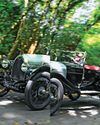
The Triumph TR7 and JensenHealey are truly the last of their kind. Not merely the last of their respective dynasties, but the last of Britain's mass-market, traditional, steel-bodied sports cars.
Certainly both have been heavily criticised and given as examples of Britain's 1970s industrial malaise. Whether in period or more recently, commentators and pundits have tarred them with the bitter brush of criticism. Lumps have been knocked out of these Brits for quality and reliability woes, rampant corrosion and even their styling. Yet here they remain, not merely still standing but looking resplendent after all these years and each with their own band of loyal enthusiasts. So surely they deserve a second chance?
The roots of both cars can be traced to the same chaotic corner of Britain's troubled motor industry. Today, it's easy to associate the British Leyland Motor Corporation (BLMC) with all manner of disaster, but the origins of the combine's problems were most definitely covered in British Motor Corporation (BMC) fingerprints. Among BMC's legion of issues was that it would spend huge sums on prototypes sometimes even multiple disparate concurrent prototypes, all intended to replace the same model - yet none would make it to production.
Healey suffered such a fate on multiple occasions. The 'Super Healey', also nicknamed Fireball XL5, came to nothing after swallowing £1m. The Healey Motor Co's own successor to the MkIII Austin-Healey 3000 was rejected, and although the MkIV 3000 was built and engineered, it didn't make production because it wasn't liked by boss Donald Healey. The problem was that it was clearly based on the MGC, itself an MGB doppelgänger. Plus, as his son Geoff would later write, its new heavier engine 'gave much trouble in early production form, and lacked the torque of the old unit'.
This story is from the April 2023 edition of Classic & Sports Car.
Start your 7-day Magzter GOLD free trial to access thousands of curated premium stories, and 9,000+ magazines and newspapers.
Already a subscriber ? Sign In
This story is from the April 2023 edition of Classic & Sports Car.
Start your 7-day Magzter GOLD free trial to access thousands of curated premium stories, and 9,000+ magazines and newspapers.
Already a subscriber? Sign In

RAY HILLIER
Double-chevron oddity proves a break from the norm for this Crewe specialist

SHORT BACK & GLIDES
Eccentric enthusiast Captain RG McLeod's series of Manx-tailed Bentley Specials reached its zenith with this unique S2 Continental.

People's choice
The diminutive but multi-million-selling Fiat 850 packed a remarkable diversity of form and function into its compact footprint

PLASTIC BREAKS FROM THE NORM
Glassfibre revolutionised niche car-body production, but just occasionally strayed into the mainstream.

A SENSIBLE SUPERCAR
The cleverly conceived four-seater Elite secured Lotus a place at the big players' table, but has it been unfairly maligned since then?

"I had a habit of grabbing second place from the jaws of victory"
From dreams of yachting glory to the Le Mans podium, via a stint at the top of the motorsport tree, Howden Ganley had quite the career

Still going strong
Herbert Engineering staked its reputation on the five-year warranty that came with its cars. A century on, this Two Litre hasn't made a claim

One for the kids
General Motors was aiming squarely at the youth market with the launch of the Pontiac GTO 60 years ago, and its runaway success popularised the muscle-car movement

A NEW BREED OF HERO
Launched at the turn of the millennium, the GT3 badge has already earned a place alongside RS, CS and turbo in Porsche lore.

Brits with SIX appeal
The straight-six engine is synonymous with a decades-long legacy of great British sports cars. Six variations on the sextet theme convene for comparison